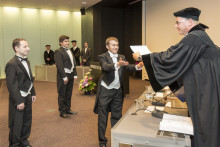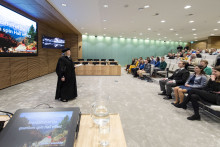In the coming days, carnival celebrations are taking place around the globe, especially in Europe, where this tradition started. Although typically taken as a roman-catholic tradition, the romans stole it (as many other things) from the Greek Anthesteria, a festival celebrated in honour of Dionysus. During this period of time, all social rules and hierarchies were set aside, and everyone celebrated together regardless of their social order.
In the Dutch academic environment we also have traditions in which members of the academia dress up, but the reason behind it is precisely the opposite as in the classical carnival celebrations. Full professors (hoogleraren) dress up in gowns (or toga, from the Latin), to emphasize their higher position in the academic hierarchy. Some of us find this contradictory with the direct, open, and informal working environment that one typically finds in the Netherlands. This is particularly puzzling when we compare the situation with some of our neighbour countries with a much more hierarchised working environment, in which the gowns are rarely or never worn in academia.
I may sound as if I dislike the gowns. That is not entirely correct, I embrace the use of gowns to celebrate academic events, as long as they are used to celebrate as a community. Wearing a gown should emphasise the impartiality of the academic and the formality of the event. But here is the problem, in the current tradition, only full professors (and some associates) are allowed to wear such a gown. This practice not only creates an unfair situation but also conveys a perplexing image to society of how the Dutch academic environment operates.
The issue just worsens when younger committee members, frequently women and foreign academics, do not wear the gown. The reason is because they still do not have the right to be promotors (ius promovendi). If I would be a non-academic person, unfamiliar with this tradition and sitting in the audience of a PhD defence, my conclusion when observing such a committee would be that wearing the gown in Dutch universities is a matter of gender and/or race.
Many of us, including KNAW’s de Jonge akademie, the Young Academy of the UT and many more, consider this tradition an anachronism. This country should be ready to embrace the gown as a symbol of unity of the academic community to celebrate together, and not as an occasion to separate and divide.
Since September 2023, the University of Utrecht decided that, since all members of a promotion committee have the same vote and rights during a PhD defence, they should all wear the toga. The same decision has been taken by the University of Amsterdam since January 2024. And strong protests have been displayed at the University of Groningen with academics wearing a TOMA (Tunic for Overlooked Mid-level Academics).
It would be a great chance for the University of Twente to join and take this little step, which has so much meaning. We would then turn PhD defences into real academic celebrations in which, for at least this period of time, we can all dress up and celebrate together as equals.







